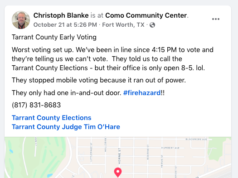Last week’s Metro (“Open Government or Legal Loopholes?” Nov. 24) detailed how an ever-increasing number of open records requests (which are used to access government documents) in Fort Worth and across the state are being blocked through loopholes in the Texas Public Information Act. Aiding in the process is indicted State Attorney General Ken Paxton, who (when he isn’t retaliating against whistleblowers and potentially racking up new criminal charges) oversees an office that rubber stamps open records rejections.
We reached out to the city with basic questions about how open records requests are handled but didn’t hear back by press time. A spokesperson with the Secretary’s Office of Fort Worth, which handles open records, recently replied, so we’re sharing that response here.
Why are legal briefings sought on roughly 10% of local open records requests? What is the policy your office follows when deciding which requests are answered and which ones are contested?
The Public Information Act sets out certain exceptions to public disclosure. When a departmental liaison reviews documents that are responsive to a request, that person is tasked with identifying whether information contains a statutory exception to disclosure. If the departmental liaison determines that the responsive records contain information that may be excepted from disclosure, then that person sends the records to the legal department for review. If the legal department agrees with the department’s assessment that certain information meets one or more of the statutory exceptions to disclosure, then the legal department will prepare and send a brief to the attorney general requesting that the information be withheld from public disclosure per the Public Information Act.
Who decides what costs are requested for open records releases, and is there an independent way for locals to verify if those numbers are reasonable?
The fees for public information are set by the Texas attorney general. Those fees are what the city charges. When there are fees charged, the responsive department works with the law department to calculate and review the fees that are charged.
Are there currently delays in open records requests due to COVID-19, and what are those delays?
There are no current delays in responding to public information requests due to COVID-19.












